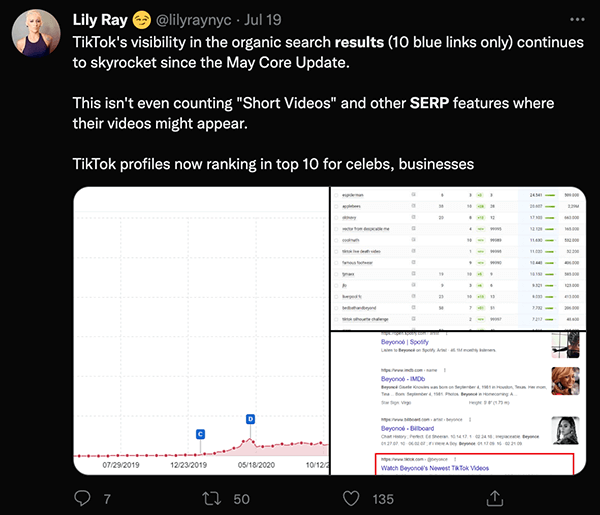SERP
Search engine results page
Example
Did you notice Google's SERPs changed significantly last month?
Yeah, they must have rolled out a significant update to their algorithm

Related Slang
| SEO | Search engine optimization |
| DA | Domain authority |
| PA | Page authority |
| STFW | Search the flippin' web |
| Webpany | Web company |
| To search the Internet | |
| LMGTFY | Let me Google that for you |
| JFGI | Just flippin' Google it |
| SGE | Search generative experience |
| GenAI | Generative AI |
 How well do you know your texting slang?
How well do you know your texting slang?
A SERP is a webpage a search engine displays that includes a list of results relevant to a query performed by the user. For example, when a user searches "slang dictionary" with the Google search engine, Google displays a SERP with a list of results (typically 10) that Google has determined (through its algorithm) to be the most relevant to the keywords in the query.
When a user performs a query with a search engine, such as Google, Bing, or Yahoo!, the search engine returns results it has compiled based on its unique algorithm. The algorithm analyzes webpages to best match the most relevant webpages with keywords in the user's query.
After compiling results, search engines display them in a SERP. Each search engine displays SERPs differently, but they all show the search field with the most recent query and a list of hypertext link results.
Each search result displayed in a SERP usually includes the webpage's title and a brief page description (they may also include other information, such as a video or image if relevant to the query). The search engine may take the description from the page's description meta tag or from snippets of text from the page that contain keywords in the search phrase.
As search engines evolve and refine their accuracy, they add additional features to SERPs. Examples include the following:
Who uses SERP?
Any netizen may use SERP to refer to the results they receive after performing a search with a search engine. However, SEO professionals, web administrators, and web content producers most often use the term as they analyze and discuss webpage performance. For example, they may discuss website rankings in web forums and use SERP to refer to where their content ranks.